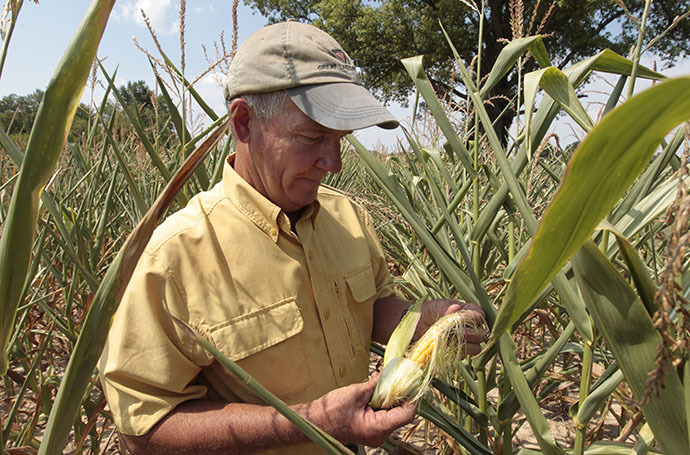Farmers falling back on chemical pesticides as GMO seeds falter

Biotech companies like Monsanto have spent millions creating and inserting genes that would make corn plants poisonous to the corn rootworm but harmless to other creatures, but now the pest has begun to develop an immunity.
While the use of chemical pesticides has always been a source of
contention, the advent of corn hybrid plants by biotech companies
like Monsanto allowed farmers to cut back on their use. These new
hybrids had been specifically designed using genes from a
bacteria called Bacillus thuringiensis (Bt), which provided a
formidable defense against corn rootworm.
Throughout parts of the midwest, however, farmers are now
discovering rootworms that are immune to the genetically modified
corn. In parts of Illinois, Minnesota and Nebraska, where
rootworm has made a comeback, farmers have now returned to using
chemical pesticides.
According to Dan Steiner, an independent crop consultant in
northeastern Nebraska, the return of the soil insecticides brings
back bad memories.
"We used to get sick [from the
chemicals]," Steiner tells NPR.
"Because we'd always dig to see
how the corn's coming along. We didn't wear the gloves and
everything, and we'd kind of puke in the middle of the day. Well,
I think we were low-dosing poison on ourselves!"
According to the US Department of Agriculture, two thirds
of all corn grown in the US is of a hybrid variety, carrying the
Bt gene that targets the rootworm. The first hybrids were
introduced in 2003 and, as their proliferation now shows, proved
to be very popular.
Though traditional pesticides may help in evening out the odds,
there are other alternatives to combat rootworm despite its
adaptation to the corn hybrid. Steiner, for one, has advocated
“starving” the rootworm
by depriving it of its food source, and advising farmers to
rotate their crops from corn.

Crop rotation, however, is not likely to prove popular among
farmers who take advantage of some $5 billion in government
subsidies per year, doled out regardless of crop prices or
yields.
Corn is by far the largest recipient of yearly crop subsidies in
the US, a policy which has been sustained in part due to corn
ethanol production, which critics say is not a viable energy
policy, and which has kept the price of corn so low that
manufacturers of processed foods in the US habitually replace
sugar with high fructose corn syrup.
According to University of Nebraska entomologist Lance Meinke,
the increasing use of chemical pesticides may well be nailed down
to the current politics of growing corn, particularly in the face
of alternatives such as crop rotation.
"I think economics are driving
everything," Meinke tells NPR.
"Corn prices have been so high
the last three years, everybody is trying to protect every
kernel. People are just really going for it right now, to be as
profitable as they can," he adds.
In the meantime, companies such as Syngenta and AMVAC Chemical,
which produce soil insecticides for corn, have reported increases
in sales of 50 to 100 per cent over the past two years.
The situation now developing with the resurgence of the corn
rootworm is not unlike that being experienced by American farmers
who have relied on Monsanto GMO seeds resistant to the company’s
own Roundup Ready herbicide.
Some fifteen years following the introduction of the
herbicide-resistant GMO seed, most of the corn, soybean and
cotton cultivated in the US is now of the Roundup Ready variety.
Some 15 years later, most of the corn, soybeans and cotton
cultivated in the US stems from these Roundup Ready seeds. While
the genetically modified crops were meant to be resistant to
application of the weed-killing Roundup herbicide, farmers are
now increasingly having to deal with Roundup-resistant
"superweeds."
It is now estimated that in the period from 1996, when the GMO
crops were introduced, to 2011, an additional 404 million pounds
of chemical pesticides were applied to US fields, amounting to a
7 per cent increase overall.














